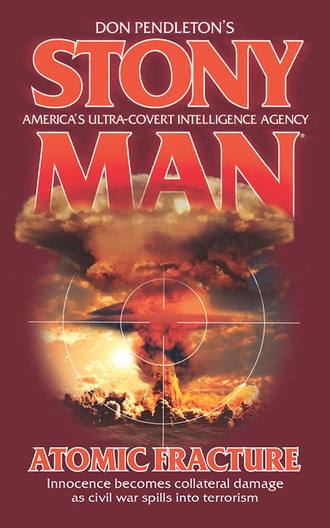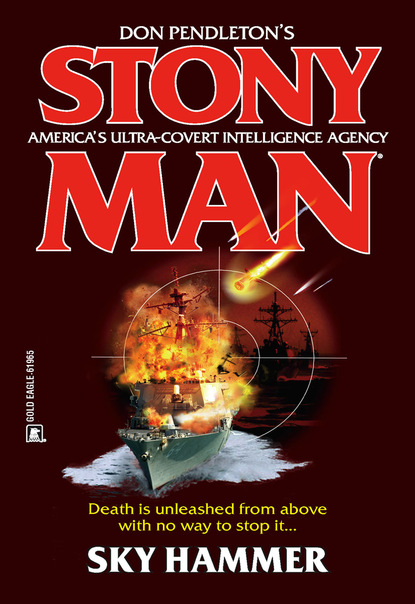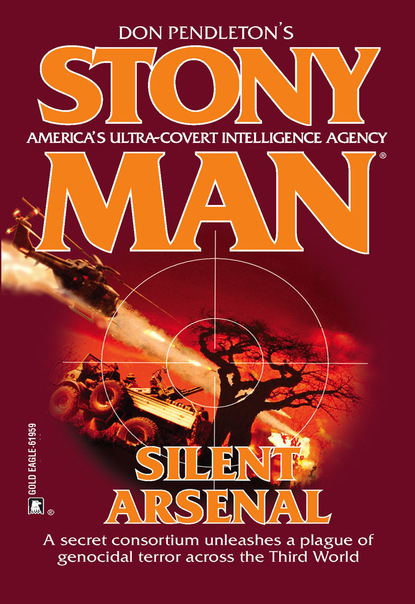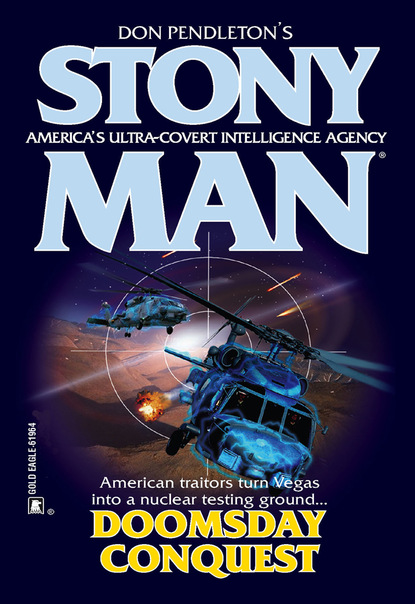
Полная версия
Atomic Fracture
Lyons, Blancanales and Schwarz said goodbye to Mott as they dropped down from the jet. Lyons moved forward toward a man who might have been the poster boy for an FBI recruitment ad. He had short, blond, brush-cut hair and broad shoulders. Even more telling was the way he moved, combining the balance of a tiger on the prowl with the apparent strength of a grizzly as he stepped up and extended his hand.
The Able Team leader gripped the man’s hand and immediately noticed two things. First, the man was a weight-lifter. FBI work could be dangerous and sometimes strenuous. But it didn’t put calluses on a man’s hands like the ones Lyons felt as they shook hands.
The second thing of which he took note was the lining of the man’s suit coat as it briefly appeared when the man extended his arm. As soon as he saw the striped material Lyons remembered that somewhere, sometime, someone had told him that striped lining inside a man’s suit meant expensive. Not being particularly interested in such things, he’d forgotten who and when. After all, he wasn’t a model for Gentleman’s Quarterly or James Bond on his way to a Monte Carlo casino. Able Team was not here to pose for men’s clothing photos or to play cards.
They had come to find out what had happened to a pair of nuclear bombs. And to kill anybody who got in their way.
“Special Agent Arthaud,” the broad-shouldered man said as he let loose of Lyons’s hand.
“Taylor,” said the other agent. He was taller and thinner. The fact was he looked more like a marathon runner than the wrestler, power-lifter or body-builder that Arthaud appeared to be. He wore an olive-green sport coat and khaki slacks.
“We have orders to supply you with a car,” said Arthaud. “Then to stay out of your way.” His smile looked genuine and it didn’t appear that he resented not knowing anything more about the men who had just arrived via Learjet.
“Thanks,” Lyons said simply. He pulled open the door of the plane’s cargo hold and he and the other men of Able Team unload their equipment bags. Their new Yankee Hill Machine Company 6.8 mm sound-suppressed rifles were in obvious padded gun cases complete with extra magazine pockets on the outside of the main compartment. When Arthaud saw them, he said, “Looks like you’re expecting something serious.”
“We always expect something serious,” Lyons said as he hefted a duffel bag in one hand and a rifle case in the other before carrying them both to the trunk of one of the Chevy sedans.
“You guys Hostage Rescue?” Taylor asked.
“Sometimes,” said Lyons, which left a quizzical look on the face of the man who had asked the question. A moment later they had finished transferring the equipment and closed the trunk. Lyons turned back to Arthaud. “Can you give us directions to the storage facility?” he asked.
Arthaud smiled again. And again it seemed genuine. “I can do better than that,” he said. “I’ve already set your GPS to take you there.”
“Ugh,” Blancanales said. “That means we’ve got to listen to that computer-generated female robot all the way there.” His voice climbed two octaves and he mimicked, “Turn right in one quarter mile. Proceed ten miles to intersection.” Then, shaking his head, he said, “And if we don’t follow directions we hear, ‘You have left the route—’” Hermann Schwarz hadn’t been nicknamed “Gadgets” for nothing. He loved, and seemed to understand instinctively, every new bit of technology that came along in a computer world that progressed at lightning speed. “Don’t worry,” he said, grinning at his partner. “I’ll dumb it down to your level and explain it to you as we go.”
Arthaud laughed and then said, “Tell you what. We’ll lead you there. Sound okay?”
“Sounds fine,” said Lyons. “But I’m afraid the front door is as far as you get. Nothing personal.”
Arthaud shrugged his big shoulders. “No problem,” he said. “It’s pretty obvious that whatever you’re here to do is highly sensitive. I mean, after all, we know the kind of stuff they’ve got stored at that facility.”
“Thanks for understanding,” Lyons said.
Arthaud chuckled. “I’m not being completely altruistic,” he said. “The bottom line is what we don’t know won’t hurt us. Meaning that if we know what you’re doing, and you screw something up, we’ll be tied up for days, maybe weeks, being interrogated ourselves as if we were criminals or terrorists.”
“Good thinking,” Lyons said. And typically bureaucratic, he thought but didn’t voice. Arthaud and Taylor both seemed like nice guys. But as happened with so many in government jobs, they had lost much of the ambition they had probably had when they’d first signed on with the FBI. They had come to know that promotions were more likely to go to agents who never made waves and had no complaints in their personnel files rather than those who worked hard, took chances and cracked major cases. And the best way to stay out of trouble was to avoid as much knowledge and work as possible.
The men of Able Team piled into the Chevy where they’d stored their gear and followed the other FBI car toward a gate in the fence that surrounded the airport. Lyons was behind the wheel. Blancanales had taken the backseat. From the shotgun seat next to the Able Team leader, Schwarz said, “Did anybody catch the other Fed’s name?”
“Taylor,” said Blancanales. “He seemed like the quiet type. Might help you to listen a little closer, old buddy, instead of always drifting off into that computer world of annoying beeps and buzzes and flashing lights.”
Behind the wheel, Lyons silently shook his head. He loved Schwarz and Blancanales like brothers, and had faced death by their sides far too many times to remember. And he knew their jabs at each other were all good-natured. When it came right down to it, any one of the three men of Able Team would lay down his life for the others. Without a thought. But sometimes the frequent friendly bickering got on his nerves.
“You could both learn something from Special Agent Taylor,” Lyons said as he pulled the Chevy through the gate and onto the highway.
“How’s that?” Schwarz said.
“Talk less and listen more,” Lyons said. “Pol had a point, too. Every once in a while you could pull your head out of that world of gadgets that earned you your nickname and take a quick look around at the real world.” He paused, then glanced up into the rearview mirror to catch Blancanales’s eyes in the reflection. “And it wouldn’t hurt you, Pol, to take a little bigger step into the twenty-first century. A lot of useful electronics have been invented since the pinball machines you played as a kid.”
Blancanales laughed. “Hey,” he said, “I played ‘Pong’ when I was a kid.”
Schwarz laughed out loud. “Pol, you do realize that saying you played ‘Pong’ is paramount to saying you played football in the days of leather helmets with no face masks, don’t you?”
He got no answer.
The Able Team leader drove on, keeping a close eye on the FBI car ahead of him and following the directions of the robotic voice of the GPS.
The highway had begun to climb upward and the Able Team leader could already note the difference in the amount of oxygen in the air. The lead FBI car took an exit, came to a four-way stop, and then turned onto an asphalt road. Now the gradual climb upward became even steeper. In the distance, Lyons could see the snowcapped tip of Pike’s Peak. They passed a sign pointing them back down the mountain where they’d find the Garden of the Gods and drove on, at first passing aspen trees, which grew at the lowest altitude that would sustain them, then encountering thicker groves as they continued to rise.
Fifteen minutes later the car carrying Arthaud and Taylor slowed, then turned onto a gravel road. Dust blew from the rear tires, rising into the air in a steady cloud as Arthaud led them around a sharp curve. Almost as soon as Lyons had made the curve in the second vehicle, he saw the gate.
Armed and uniformed men stood immediately in front of it. And through the window of the guard shack in the middle of the road they could see the heads of more guards.
Arthaud brought his Chevy to a halt and Lyons pulled in behind him as one of the guards moved forward toward the driver’s window. From a distance, it appeared to Lyons that he wore a standard flak jacket in woodland camo with front-mounted ammo pouches. On his head was a black beret but the insignia was on the far side of the slanted hat and all but invisible. He carried a clipboard in one hand, a ballpoint pen in the other, with his M-4 slung over his shoulder. The carry was more comfortable than the assault position, but took longer to bring into play. But the man’s hands were busy with a clipboard and a ballpoint pen anyway, and he was relying on the other guards to keep them covered until their identities had been established.
And keep the men in the Chevys covered, they did. At least a half dozen 5.56 mm carbines were pointing directly toward the two vehicles. The Able Team leader knew that in less than half a second they could be blasted into more pieces than the Titanic when it finally sank.
The conversation between Arthaud and the guard was brief. A second later Arthaud exited his car and walked back to Lyons.
The Able Team leader pushed the button, lowering the window at his side.
“Looks like you were right earlier when you said this is as far as we go,” the burly man in the high-dollar suit said. “They’ve got orders to let you guys in. But not us.”
“Thanks for leading the way here,” Lyons said.
“No problem,” said Arthaud. “Nice change from pushing paper.” His smile still looked as if he meant every word he said.
Lyons waited as Arthaud got back in his car and pulled through the gate. As the automobile that had brought them here to this first line of defense made a U-turn, he pulled up to the guard house. The same man in the black beret stepped forward as Arthaud and Taylor drove out on the other side of the guard shack.
Now, as the uniformed man leaned down toward the open driver’s side window, Lyons could see the patch of the U.S. 75th Ranger Regiment on his beret.
That slightly surprised the Able Team leader. The 75th had seen its share of action during World War II, Korea, Vietnam and other, smaller wars. But it had been redesigned in 1973 to be a highly mobile light infantry unit capable of operating in any part of the world at a moment’s notice. They’d been active most recently in Bosnia, then Iraq and Afghanistan.
Guard duty, it seemed to Lyons, even at a nuclear storage facility, was a waste of talent and training. It was like putting an NFL coach who’d won the Super Bowl in charge of training a junior high football team.
Carl Lyons might have been less loquacious than his fellow Able Team warriors but he had never been the timid sort. As he held up the FBI credentials supplied by Brognola, he said bluntly, “That patch tells me you’re 75th. So I’ve gotta ask. Why are you guys even here? You’re pulling guard duty any rent-a-cop could manage.”
The Ranger had taken Lyons’s credentials and was studying them. But the comment made him laugh. “We just got here yesterday,” he said. “All we know is that something extraordinary has happened. We’re on high alert. And my guess is it’s the same thing that brings you guys here, Special Agent Coffman.” He handed the credential wallet back through the window. “Care to share that intel with me?”
“Sorry,” Lyons said as he replaced the black leather case inside his suit coat. “I hate to sound like the typical, pompous FBI jerk-off who wants everything you know, then answers all of your questions with, ‘We’re not at liberty to disclose that information.’ But I’m afraid that’s what I’ve got to do.” He waited for a reaction, remembering how badly he’d wanted to punch out several arrogant FBI agents when he’d still been a LAPD detective. There had been one Fed whose face he actually had smashed in. That had bought him a seemingly endless stream of interrogation by both the FBI and the LAPD Internal Affairs goons, and almost made him wish he’d just knocked himself out instead of enduring the tedium brought on by the cops who go after cops.The Ranger nodded. “No problem,” he said. “That’s pretty much the answer I was expecting,” he said, grinning. “And you’re right.”
Lyons returned the facial expression with one of his own rare smiles. But he was soon to find out that he’d misinterpreted the other man’s words. “Thanks for understanding,” he said.
“Oh, I didn’t say I understood,” the Army Ranger said. “I was just agreeing that you’re a typical pompous FBI jerk-off.”
Lyons didn’t feel the rush of anger he might have expected to overcome him. Instead he felt sympathy—no, empathy—for the Ranger at the gate. He had walked in that man’s combat boots and knew how they felt.
“Okay, then,” said the Ranger. “You’ve still got retina and facial recognition to go through at the front door of the main offices. But I’ll have a man lead you there.” He straightened and Lyons rolled up his window. The Able Team leader pulled through the gate as a green Army jeep, driven by another man wearing Ranger regalia, pulled out in front of him. Next to him, he could see Schwarz. In the rearview mirror, Blancanales’s face stared back at him. Both looked as if they were doing their best not to laugh.
“Ever think about switching to the diplomatic corps, Ironman?” Schwarz asked. “You’d be a natural. If I was President, I’d like, make you ambassador to North Korea or Iran or someplace where your smooth and disarming charm would end the world’s problems.”
“I thought he controlled himself pretty well,” said Blancanales. “Considering what we both know was going through his mind.”
Lyons shook his head as he followed the jeep. “That’s enough,” he said. “We’ve got a mission ahead of us. Let’s get our minds on that.”
The dirt road took a sharp curve and suddenly the front of a structure built into the side of a mountain appeared.
Конец ознакомительного фрагмента.
Текст предоставлен ООО «ЛитРес».
Прочитайте эту книгу целиком, купив полную легальную версию на ЛитРес.
Безопасно оплатить книгу можно банковской картой Visa, MasterCard, Maestro, со счета мобильного телефона, с платежного терминала, в салоне МТС или Связной, через PayPal, WebMoney, Яндекс.Деньги, QIWI Кошелек, бонусными картами или другим удобным Вам способом.












